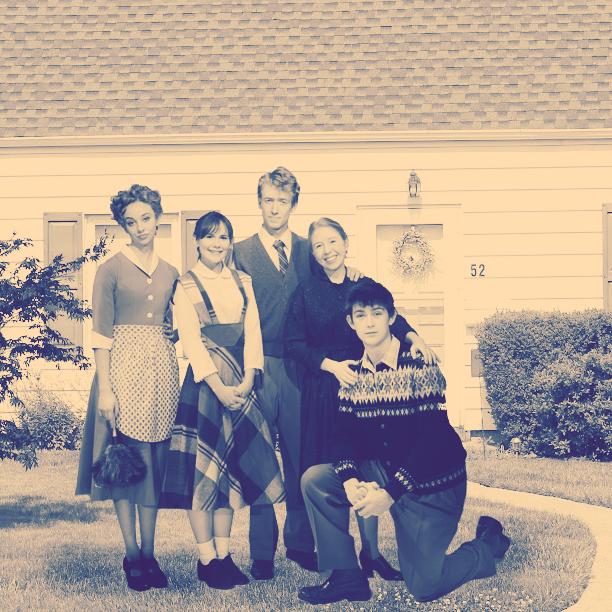U-M producing now-rare Thornton Wilder play 'The Skin of our Teeth'

Brittany Uomoleale as Sabine, Shannon Eagen as Gladys, Ben Blackman as Mr. Antrobus, Elly Jarvis as Mrs. Antrobus, and Robert O'Brien as Henry in "The Skin of Our Teeth."
photo by Peter Smith Photography | courtesy of the University of Michigan
“It’s a tricky play to pull off,” said Jonathan Berry, a Chicago-based theater artist (and ‘97 U-M grad) who’s directing "Teeth.' “In my brief time in New York, I met a producer—a really smart man who’s produced lots of shows—and we were talking about the show. He said of all the times he’d seen it, he’d seen it done well maybe once.”
Why is “Teeth” - which Wilder wrote one month after the bombing of Pearl Harbor -Â such a challenge?
Because it’s an allegory that mashes eras together in order to depict a history of mankind by way of the Antrobus family of Excelsior, New Jersey. The first act mixes the early 20th century with the Ice Age, with the father inventing the wheel and multiplication tables, and disparate figures like Moses, Homer and the Muses appear arriving at the family’s home. The second act features the father being sworn in as President of the mammals, only to be faced with a flood that has him, Noah-like, guiding pairs of animals onto a boat. And the third act has the couple emerging from the cellar, with a baby, after seven years of war, and the actors struggle with illness to such a degree that behind-the-scenes workers have to step into the roles.
PREVIEW
”The Skin of Our Teeth”
- Who: University of Michigan department of theatre and drama.
- What: Thornton Wilder’s Pulitzer Prize-winning play about the Antrobus family of Excelsior, New Jersey, who, on what seems a typical day, are staring down the apocalypse. Fortunately, the family is experienced with survival, having already lived through the end of the world several times during the past 5,000 years.
- Where: Lydia Mendelssohn Theatre, 911 N. University Ave. in Ann Arbor.
- When: Thursday, Feb. 21 at 7:30 p.m.; Friday and Saturday, Feb. 22 and 23 at 8 p.m.; and Sunday, Feb. 24 at 2 p.m.
- How much: $20 or $26 ($10 for students). 734-764-2538 or www.tickets.music.umich.edu.
“Teeth” premiered in 1942, when America had been through the Depression and was still embroiled in World War II; and while a play about a family repeatedly facing the end of the world doesn’t sound optimistic or funny, it is, because the people always find a way to survive.
“When (Wilder) sat down to write it, … he was afraid that theater was losing its bite, and losing its ability to be used to move hearts and minds,” said Berry. “Theater in New York at that time, during the war, was about making people feel good, and being sweet. So Wilder sat down to write a play that was challenging. It broke the fourth wall quite a bit, and there are lots of shifts in style and tone that kept audience leaning forward. So they couldn’t sit back and get complacent in watching.
“ … I don’t mean to set (‘Teeth’) up as theatrical cod liver oil, though. It’s written with great humor and affection and a love of humanity, as with all Wilder’s plays. The humanism always comes through.”
And although Berry reports that at least one student cast in the show admitted to feeling wary of the show—before ‘Teeth’ won him over—the timeliness of the play couldn’t be better, given the complex, global challenges that humanity now faces.
“I think I was so focused on the challenges inherent in the script at first that I missed how beautiful the play was,” said Berry. “When I’m watching my own plays, … I’m usually only seeing the 17 things I need to fix. But two or three times in rehearsal with this, I’ve been watching a scene, and I’ll stop taking notes, and just watch what the actors are doing with this beautiful piece of writing. I’ve been unexpectedly moved by it. I knew it was there, but I don’t think I expected it to be quite so present. You can really feel it when the room goes quiet - and that’s saying something in a room full of 22 year old college students. But they feel it working, too.”
Jenn McKee is the entertainment digital journalist for AnnArbor.com. Reach her at jennmckee@annarbor.com or 734-623-2546, and follow her on Twitter @jennmckee.


Comments
James
Sat, Feb 16, 2013 : 8:18 p.m.
I love it when the dinosaur says "It's cold".